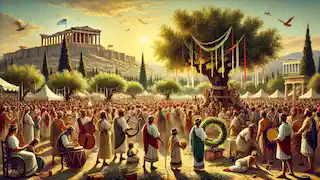In the heart of ancient Greece, amid the hills and valleys that cradle the city of Athens, there stood a tree unlike any other. It was a tree whose roots ran deep through the earth, touching the very essence of time itself. This was no ordinary tree—it was the Sacred Olive Tree, a living symbol of peace, wisdom, and prosperity. Legend told that this tree was a divine gift from the goddess Athena herself, bestowed upon the people of Athens as a symbol of her protection and favor.
The story of the Sacred Olive Tree of Athens has been passed down through the generations, whispered among the winds of time. From the ancient philosophers who pondered beneath its shade to the warriors who rested their swords upon its bark, the tree witnessed the rise and fall of empires, the birth of democracy, and the perseverance of a city that would become the heart of Western civilization.
Our tale begins in the early days of Athens, when the city was still young and its people were in search of a patron deity to guide and protect them. In the days of old, the city of Athens was known by a different name—Cecropia, named after its first king, Cecrops. Half-man and half-serpent, Cecrops was wise and beloved by his people, yet his city lacked a divine patron, a protector to guide it into a prosperous future. The gods of Olympus took notice of this thriving city, each vying to become its guardian. Among them were two of the most powerful deities: Poseidon, god of the sea, and Athena, goddess of wisdom and warfare. The people of Athens admired both gods, but they knew they could choose only one to be their protector. To settle the matter, Zeus, king of the gods, declared that a contest would be held, and the winner would forever be the patron of the city. Poseidon, with his trident raised high, struck the ground of Athens. From the earth, a mighty spring of saltwater surged forth, crashing down in a torrent of sea foam and thunderous waves. His gift was a demonstration of his power over the seas, promising the Athenians control over maritime trade and naval dominance. Athena, in her wisdom, offered a more subtle gift. She knelt before the people and touched the ground with her spear. From the soil sprang a delicate sapling, an olive tree that shimmered with a soft, golden hue. "This tree," Athena spoke, "will provide you with food, oil, and wood. It will offer shade in the heat of the sun and peace in times of war. Let it be a symbol of prosperity and wisdom." The people of Athens were moved by the practicality and beauty of Athena's gift. While Poseidon's spring was magnificent, its water was salty and undrinkable. The olive tree, on the other hand, promised sustenance and stability for generations to come. The choice was clear, and the people declared Athena their patron deity. In her honor, the city was renamed Athens, and the sacred olive tree became a cherished symbol of the goddess's protection. Yet, this was only the beginning of the tree's journey through history. The Sacred Olive Tree grew tall and strong in the heart of Athens, and as it flourished, so did the city. The olive’s silvery leaves caught the sunlight, casting a soft glow upon the Acropolis where it stood. It became a sacred site, where citizens would gather to offer prayers to Athena, seeking her wisdom in times of peace and strength in times of war. Throughout the centuries, the tree stood as a beacon of hope and resilience. When Athens faced its darkest days—whether from invasion, famine, or plague—the olive tree remained steadfast, reminding the Athenians that their patron goddess watched over them. The fruit of the tree was used not only for sustenance but also for the sacred oil that illuminated their temples and sanctuaries. It was said that as long as the olive tree lived, Athens would never fall. During the Greco-Persian Wars, as the mighty Persian army threatened to conquer all of Greece, the Sacred Olive Tree took on an even greater significance. When the Persians burned Athens to the ground during the sack of the city, the Athenians feared that all was lost, including their sacred tree. But when they returned to the ruins of their city, they found the olive tree had miraculously survived, a single shoot sprouting from its charred remains. This new growth was seen as a divine sign from Athena—a promise that Athens would rise from the ashes stronger than before. The Athenians rebuilt their city, and the Sacred Olive Tree became a symbol not only of Athena's protection but of the resilience and endurance of the Athenian people themselves. With Athena’s blessing, the olive tree became more than just a symbol; it became the foundation of Athenian prosperity. Olive oil was a prized commodity, traded across the Mediterranean and used in everything from cooking to religious ceremonies. The groves of olive trees that spread across the Athenian countryside ensured the city's wealth and influence for generations. The Sacred Olive Tree on the Acropolis became a pilgrimage site for those seeking wisdom and favor from Athena. Philosophers, poets, and artists alike were drawn to the tree's shade, where they would sit in quiet contemplation, hoping to be inspired by the goddess of wisdom. It is said that Socrates himself, the great philosopher of Athens, would often walk the path leading to the olive tree. There, beneath its ancient branches, he engaged in deep discussions with his students, questioning the nature of knowledge, justice, and the gods. The olive tree, a silent witness to these dialogues, became synonymous with the pursuit of wisdom. Even in times of political strife, when Athens was embroiled in internal conflicts and wars with rival city-states, the olive tree remained a symbol of peace. Diplomats from across the Greek world would gather beneath its branches to negotiate treaties, for it was believed that no blood could be spilled in the presence of Athena’s sacred tree. Centuries passed, and the Sacred Olive Tree continued to watch over Athens, its roots growing deeper into the earth as the city expanded around it. However, as the world changed, so too did the fortunes of Athens. The once-great city was weakened by internal strife and external threats. The darkest days came during the Peloponnesian War, a brutal conflict between Athens and its rival, Sparta. The war raged for years, and the people of Athens began to lose hope. Food became scarce, and disease swept through the city. Yet, through it all, the Sacred Olive Tree continued to stand, offering its fruit to sustain the people. But the war took its toll on the once-great city. In the final years of the conflict, Athens was besieged by the Spartans. The city's walls were breached, and its citizens were forced to surrender. Many feared that the Sacred Olive Tree would fall, just as the city had. Yet, even in defeat, the olive tree remained untouched. The Spartans, despite their victory, respected the sacredness of the tree. They knew that to harm it would bring the wrath of Athena upon them. And so, the Sacred Olive Tree survived, a symbol of hope in the darkest of times. As the centuries passed, Athens went through many changes. The city was ruled by various empires, including the Romans, the Byzantines, and the Ottomans. Yet, through all the turmoil and upheaval, the Sacred Olive Tree endured. Each new ruler of Athens, whether they believed in the old gods or not, recognized the significance of the tree. It was not merely a relic of a bygone era but a living connection to the past. To the people of Athens, the tree was a reminder of their city's long and storied history, a symbol of the wisdom, resilience, and endurance that had carried them through countless trials. In modern times, the Sacred Olive Tree remains an important symbol of Athens. Although the original tree no longer stands, having been destroyed in various invasions and conflicts over the millennia, its descendants continue to grow on the Acropolis, just as Athena had intended. Every year, as part of the Panathenaic Festival, Athenians gather to honor Athena and her sacred tree. They celebrate the goddess's gift of wisdom and prosperity, and they reflect on the resilience of their city, just as their ancestors did centuries ago. The Sacred Olive Tree of Athens may be ancient, but its legacy continues to inspire. Its branches, once a symbol of divine favor, now represent the strength of a people who have endured the test of time. In the heart of modern Athens, beneath the shadow of the Acropolis, the descendants of the sacred tree stand tall, their leaves shimmering in the golden light of the Greek sun. And so, the tale of the Sacred Olive Tree of Athens continues, its roots forever entwined with the history and spirit of the city it was destined to protect.The Contest of the Gods

The Tree’s Guardianship
Wisdom and Prosperity

The Siege of Athens

Renewal and Legacy




















